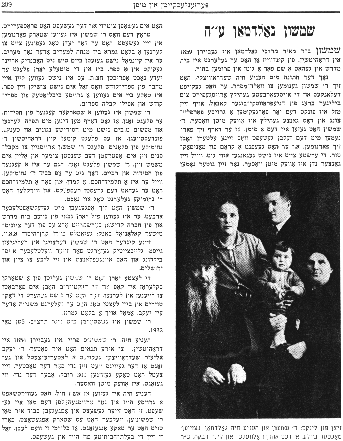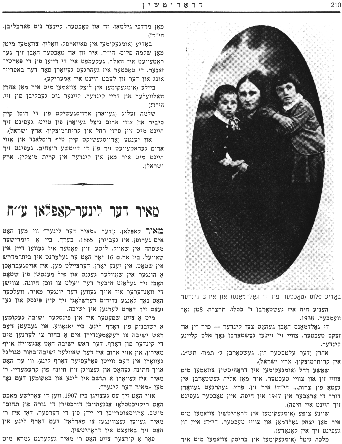Previous Page
|
Next Page

[Page 209]
SHIMSHON GOLDMAN
[Photo:] Seated from left: R. Shimshon and Henya Chaya Goldman. Standing,
daughter Beila, son-in-law Aharon Volveler and child Rivka
Shimshon, the son of Meir Mordechai Goldman was born in 1859 in Drohitchin. He studied in the House of Study from early childhood, and earned a reputation as a good and religious young man. After he married Henya Chaya Shedrovitsky, R. Shimshon got involved in the lumber business. He bought plots of trees, processed the wood, and shipped it down the Dnieprovsk-Bug Canal. Unfortunately, that very year there was a flood, and all the wood was washed away. R. Shimshon saw this as an omen that he should be involved in the same work as his parents, so he opened a textiles store. At first business didn't go very well, since his money was washed away in the flood, however his good reputation earned him trust among customers, and the business prospered.
Despite the fact that R. Shimshon was very involved in his business, he still found time every day to study a page of Talmud between the afternoon and evening prayer services, or after the evening prayers. He never sat at a table without a book in front of him. Until he reached middle age, he also used to recite the Midnight prayers as well, and there wasn't any religious author whose books he hadn't read. He had a large library of religious books, including books on kabbalah.
R. Shimshon was a strong opponent of Hassidism, and he would say that a Jew should serve G-d with prayers, study and acts of kindness, not with hassidic melodies or dances. Nevertheless, whenever R. Nachumka of Slonim came to Drohitchin, R. Shimshon would be there to welcome him. He would provide R. Nachumka with the best room in the house, and serve him. R. Shimshon used to say that even though he was an opponent of Hassidism and Rebbes, he respected R. Nachumka, because R. Nachumka was a scholar, and he had the greatest respect for a scholar. Indeed, R. Nachumka used to study night and day.
R. Shimshon was involved in community affairs: for many years he was the custodian of the New House of Study and the burial society; he promoted shares in the Zionist Colonial Bank; he collected money for the Jewish National Fund, etc. R. Shimshon raised his children to be religious, but made sure they had general knowledge as well, imbibing them with a love of Zion and Jerusalem.
In his later years, R. Shimshon suffered a stroke, and the doctors forbade him from reading or studying. However, he refused to listen to them, and until his last day continued to study Mishnah, the Eyn Yaakov Anthology, and even a page of Talmud. R. Shimshon died on May 5, 1932.
Henya Chaya, R. Shimshon's wife, was born in 1854 in Drohitchin. For her engagement, her father R. Yaakov Eliezer Shedrovitsky bought a lottery ticket, and said that the prize would be given to his daughter for her dowry. Indeed, he won 300 rubles, but the money was lost in the flood.
Henya Chaya was a virtuous woman, ran a large home, and even helped her husband in his business. She had tremendous respect for her husband, and he did for her too. Before he passed away, R. Shimshon stated that as long she Henya Chaya lived, she should always remain the owner of the house and business.

[Page 210]
[photo:] Bodya Fluss (daughter of the Goldmans) and her children
Henya Chaya died on November 8, 1938. The Goldmans had ten children – four sons and six daughters. Two sons died as small children. The eldest son, Aharon, died on July 6, 1943 in Kiryat Motzkin, Palestine. Sasha Rachel ( perished in Drohitchin together with her two sons and two daughters, and her husband Eliyahu died in the ghetto. May
G-d avenge their deaths! Her son, Peretz, was killed by Arabs in Haifa in 1947. One daughter [lives] in Haifa).
Sheina Tzippa (perished in Drohitchin together with her husband Yitzchak Goldman, and two daughters. May G-d avenge their blood! One son [lives] in Canada).
Malka Gittel (perished in Brisk together with her husband Mordechai Gillman, son and daughter. None survived, may G-d avenge their blood!).
Bodya (perished in Favorsk, Volhyn, together with her husband Shlomo Fluss, may G-d avenge their blood. Her son and daughter survived in the forest, and fought with the partisans. The daughter was killed before liberation, and the son [lives] in the United States).
Beila (perished in Lutsk together with her husband, Aharon Volveler, and three children. None survived. May G-d avenge their blood!).
Shlomo Zelig (deported to Siberia by the Russians, and thereby survived, today [lives] with his wife Rachel in Kiryat Motzkin, Israel).
Yenta (deported deep into Russia, today [lives] with her husband and children in Kiryat Motzkin, Israel).
Meir Kaplan of Lina
Meir Kaplan, or Meir of Lina, as he was known, was born in approximately 1865 into a scholarly family in Shavel, Lithuania. His father was a rabbinical judge in Shavel. Until he was around 16, Meir studied in a House of Study in town. In those days there was supposedly a famine in the Shavel region, and many people left town to look for food to survive. Among the wanderers was young Meir, who after wandering for a long time arrived in Pinsk, where he enrolled in yeshiva.
Some time later, a villager from the village of Lina, near Yanova, arrived at the yeshiva in Pinsk, and asked the head of the yeshiva to recommend a young man to teach the children in the village. The head of the yeshiva pointed to Meir, and thus the young man from Shavel ended up in the far-away Polesia village of Lina, where he got married and opened a store. R. Meir was a resident of Lina, and was nicknamed Meir of Lina.
Things changed in 1907, when the Czarist regime began to ruthlessly enforce the decree to move Jews out of villages. R. Meir was therefore forced to leave Lina, and moved to Drohitchin. For a brief period R. Meir taught Talmud to the older children at
Previous Page
|
Next Page
This material is made available by JewishGen, Inc.
and the Yizkor Book Project for the purpose of
fulfilling our
mission of disseminating information about the Holocaust and
destroyed Jewish communities.
This material may not be copied,
sold or bartered without JewishGen, Inc.'s permission. Rights may be
reserved by the copyright holder.
JewishGen, Inc. makes no representations regarding the accuracy of
the translation. The reader may wish to refer to the original material
for verification.
JewishGen is not responsible for inaccuracies or omissions in the original work and cannot rewrite or edit the text to correct inaccuracies and/or omissions.
Our mission is to produce a translation of the original work and we cannot verify the accuracy of statements or alter facts cited.
 Drogichin, Belarus
Drogichin, Belarus
 Yizkor Book Project
Yizkor Book Project
 JewishGen Home Page
JewishGen Home Page
Yizkor Book Director, Lance Ackerfeld
This web page created by Lance Ackerfeld
Copyright © 1999-2026 by JewishGen, Inc.
Updated 13 Dec 2001 by LA

 Drogichin, Belarus
Drogichin, Belarus
 Yizkor Book Project
Yizkor Book Project
 JewishGen Home Page
JewishGen Home Page